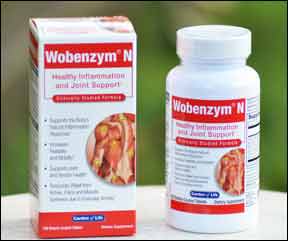Enzymes given with food are used for digestion, but certain enzymes (proteases, which break down proteins) can also help with inflammation, pain, recovery from injury, and more when given apart from food. Systemic enzyme therapy, also called metabolic or proteolytic enzyme therapy, allows enzymes to enter the body where they can be used for healing rather than digestion. Examples of proteolytic enzymes include pancreatin, trypsin, and chymotrypsin (from the pancreas); bromelain (from pineapple); and papain (from papaya). Proteolytic enzymes work best for inflammation when given away from meals and combined with bioflavonoids such as quercetin or rutin (rutosid).

288
BENEFITS: Systemic enzyme therapy is theorized to work by breaking down proteins in the blood that cause inflammation, and by removing fibrin, which prolongs inflammation. Proponents say that systemic enzyme therapy promotes health in every part of the body by reducing pain and inflammation, speeding healing, supporting a healthy immune system, shrinking tumors, and preventing metastasis from cancer.
Enzyme therapy may also help to prevent soreness and injury during and after exercise when taken routinely. Holistic veterinarians may prescribe systemic enzyme therapy for arthritis and other conditions involving inflammation; injuries; skin and coat problems; cancer; autoimmune disorders; and before and after surgery to reduce swelling, bruising, and pain.
Studies in the U.S. are limited, but systemic enzyme therapy has been studied and used in Germany for decades.
For example, a 2008 German review of “rigorous clinical studies” published in the journal Integrative Cancer Therapies found that “systemic enzyme therapy significantly decreased tumor-induced and therapy-induced side effects and complaints such as nausea, gastrointestinal complaints, fatigue, weight loss, and restlessness and obviously stabilized the quality of life. For plasmacytoma patients, complementary systemic enzyme therapy was shown to increase the response rates, the duration of remissions, and the overall survival times.”
CAUTIONS: Proteolytic enzymes can thin the blood and increase the risk of bleeding, especially at higher doses. Do not give to dogs with clotting disorders, gastric ulcers, or those receiving blood-thinning medications. If anemia or signs of bleeding develop, discontinue right away. High doses may cause diarrhea.
DOSAGE: Give enzyme products between meals (at least one hour before or two hours after) for systemic effects. Follow product dosage instructions, adjusting human dosage for the size of your dog. Companies that make products for both people and dogs suggest giving 3 tablets twice a day for adult humans, 3 tablets once a day for dogs weighing 51-100 pounds, 2 tablets daily for dogs weighing 21 to 50 pounds, and 1 tablet daily for dogs weighing 13 to 20 pounds. Higher doses are recommended for a variety of conditions.
RECOMMENDED SOURCES: The most popular enzyme formulas contain pancreatin, bromelain, papain, rutin, trypsin, and chymotrypsin, and are enteric coated to protect the enzymes from breaking down in the stomach. Some companies make canine versions that have the same ingredients as their human products. Products made for humans are generally more economical. Recommended sources include:
-Garden of Life’s Wobenzym N (gardenoflife.com, 866-465-0051) (Fido-Wobenzyme, the version labeled specifically for canine use, appears to have been discontinued)
-Vitacost’s FlavenZym (vitacost.com, 800-381-0759)
-Naturally Vitamins’ Medizym, Medizym V, and Medizym-Fido (naturally.com, 800-899-4499)
-Enzymatic Therapy’s Mega-Zyme (enzy.com, 800-783-2286)
-Bromelain supplements, alone and in combination with bioflavonoids and other ingredients, are available from many companies, such as Now Foods’ Quercetin with Bromelain (nowfoods.com, 888-669-3663)
More information: See “Banking on Enzymes,” WDJ January 2001 and “Digest These Benefits,” WDJ October 2005.
Mary Straus is the owner of DogAware.com. Straus and her Norwich Terrier, Ella, live in the San Francisco Bay Area.






